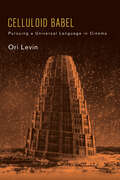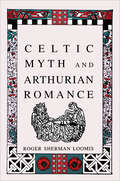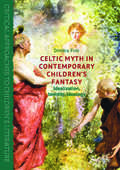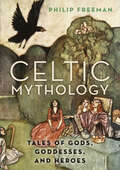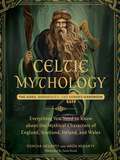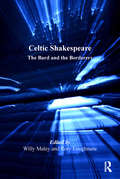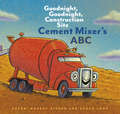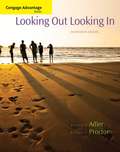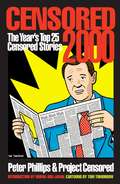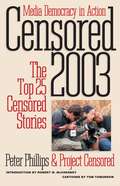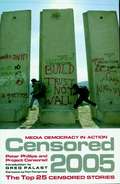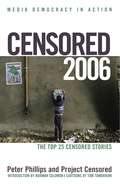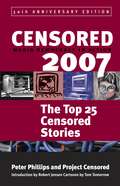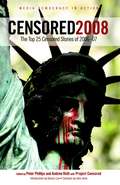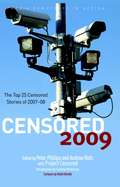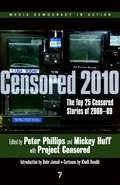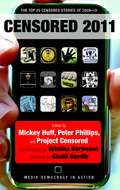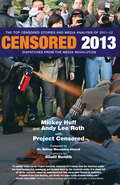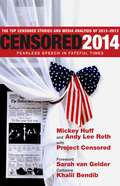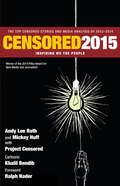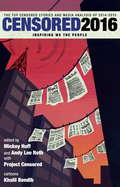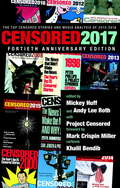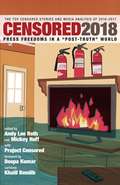- Table View
- List View
Cell Phones: Bringing the World Together [Grade 2]
by Chandler Tyrrell Lyle MillerNIMAC-sourced textbook
Celluloid Babel: Pursuing a Universal Language in Cinema (SUNY series, Horizons of Cinema)
by Ori LevinTraces the intellectual history of cinema's aspiration to create a universal language, examining how this vision has been articulated in both writings and films.Celluloid Babel offers a transnational intellectual history of cinema's quest for universal language, unfolding through both writings and films. Today, algorithms and data-collection systems play a significant role in predicting the viewer's preferences and suggesting content specifically tailored to their particular interests. However, this promise of on-demand personalized media is markedly different from the promise outlined in cinema's initial promotional discourse, which celebrated the medium’s ability to appeal to a universal audience. Instead of targeting fragmented audiences, cinema was supposed to captivate and engage everyone all at once, regardless of social station, educational level, or national affiliation. The aspiration for a universal language left an indelible mark on film history, yet despite its significance, the history and theory behind it remain largely unexplored. Celluloid Babel illuminates a pivotal chapter in early film theory and establishes it as the inaugural paradigm of thought on cinema’s nature. By exploring this pursuit, the book reveals the forgotten utopian potential of mass media and uncovers complex correlations among political ideals, aesthetic preferences, material conditions, modes of spectatorship, and governance.
Celtic Myth and Arthurian Romance
by Roger Sherman LoomisKing Arthur was not an Englishman, but a Celtic warrior, according to Loomis, whose research into the background of the Arthurian legend reveals findings which are both illuminating and highly controversial. The author sees the vegetarian goddess as the prototype of many damsels in Arthurian romance, and Arthur's knights as the gods of sun and storm. If Loomis's arguments are accepted, where does this leave the historic Arthur?
Celtic Myth in Contemporary Children’s Fantasy: Idealization, Identity, Ideology (Critical Approaches to Children's Literature)
by Dimitra FimiThis book examines the creative uses of "Celtic" myth in contemporary fantasy written for children or young adults from the 1960s to the 2000s. Its scope ranges from classic children's fantasies such as Lloyd Alexander's The Chronicles of Prydain and Alan Garner's The Owl Service, to some of the most recent, award-winning fantasy authors of the last decade, such as Kate Thompson (The New Policeman) and Catherine Fisher (Darkhenge). The book focuses on the ways these fantasy works have appropriated and adapted Irish and Welsh medieval literature in order to highlight different perceptions of "Celticity. " The term "Celtic" itself is interrogated in light of recent debates in Celtic studies, in order to explore a fictional representation of a national past that is often romanticized and political.
Celtic Mythology: Tales of Gods, Goddesses, and Heroes
by Philip FreemanMost people have heard of the Celts--the elusive, ancient tribal people who resided in present-day England, Ireland, Scotland and France. <P><P> Paradoxically characterized as both barbaric and innocent, the Celts appeal to the modern world as a symbol of a bygone era, a world destroyed by the ambition of empire and the spread of Christianity throughout Western Europe. Despite the pervasive cultural and literary influence of the Celts, shockingly little is known of their way of life and beliefs, because very few records of their stories exist. <P><P>In this book, for the first time, Philip Freeman brings together the best stories of Celtic mythology. Everyone today knows about the gods and heroes of the ancient Greeks, such as Zeus, Hera, and Hercules, but how many people have heard of the Gaulish god Lugus or the magical Welsh queen Rhiannon or the great Irish warrior Cú Chulainn? We still thrill to the story of the Trojan War, but the epic battles of the Irish Táin Bó Cuailgne are known only to a few. And yet those who have read the stories of Celtic myth and legend-among them writers like J. R. R. Tolkien and C. S. Lewis-have been deeply moved and influenced by these amazing tales, for there is nothing in the world quite like them. <P><P>In these stories a mysterious and invisible realm of gods and spirits exists alongside and sometimes crosses over into our own human world; fierce women warriors battle with kings and heroes, and even the rules of time and space can be suspended. Captured in vivid prose these shadowy figures-gods, goddesses, and heroes-come to life for the modern reader.
Celtic Mythology: The Gods, Goddesses, and Heroes Handbook (World Mythology and Folklore Series)
by Sorcha Hegarty Aron HegartyDiscover the gods, goddesses, heroes, and monsters from Celtic mythology with this beautiful book that captures the ancient stories and tales that captivated the Celts.Prepare to be entertained as you learn about the many myths and legends of the Celtic people. From the storytelling duo behind the Candlelit Tales, this collection weaves together the stories of those heroes, deities, and monsters that make up the mythology. Drawing together the mythology and tales of England, Scotland, Ireland, and Wales, this book is a comprehensive collection of the fascinating gods, goddesses, heroes, and monsters that make up the compendium of Celtic myths and legends. Celtic Mythology offers an accessible exploration of the rich tapestry of stories and characters that define Celtic culture and have fascinated people for centuries.
Celtic Shakespeare: The Bard and the Borderers
by Rory LoughnaneDrawing together some of the leading academics in the field of Shakespeare studies, this volume examines the commonalities and differences in addressing a notionally 'Celtic' Shakespeare. Celtic contexts have been established for many of Shakespeare's plays, and there has been interest too in the ways in which Irish, Scottish and Welsh critics, editors and translators have reimagined Shakespeare, claiming, connecting with and correcting him. This collection fills a major gap in literary criticism by bringing together the best scholarship on the individual nations of Ireland, Scotland and Wales in a way that emphasizes cultural crossovers and crucibles of conflict. The volume is divided into three chronologically ordered sections: Tudor Reflections, Stuart Revisions and Celtic Afterlives. This division of essays directs attention to Shakespeare's transformed treatment of national identity in plays written respectively in the reigns of Elizabeth and James, but also takes account of later regional receptions and the cultural impact of the playwright's dramatic works. The first two sections contain fresh readings of a number of the individual plays, and pay particular attention to the ways in which Shakespeare attends to contemporary understandings of national identity in the light of recent history. Juxtaposing this material with subsequent critical receptions of Shakespeare's works, from Milton to Shaw, this volume addresses a significant critical lacuna in Shakespearean criticism. Rather than reading these plays from a solitary national perspective, the essays in this volume cohere in a wide-ranging treatment of Shakespeare's direct and oblique references to the archipelago, and the problematic issue of national identity.
Cement Mixer's ABC: Goodnight, Goodnight, Construction Site (Goodnight, Goodnight, Construc)
by Sherri Duskey RinkerWritten by the author of the New York Times bestselling Goodnight, Goodnight Construction Site children's book series.More than two million Goodnight, Goodnight Construction Site books have sold across the series. From the author of the best-selling, #1 New York Times Best-selling book Goodnight, Goodnight Construction Site, this new alphabet concept board book features the same characters as the original, but is written for a younger audience. This lyrical story helps toddlers sing along with Cement Mixer, who churns out a rollicking alphabet rhyme while he shows Bulldozer that work can be fun and teaches little readers the words of the construction site, from A to Z. Work is always lighter when there is someone by your side to sing along!Teaches children about friendship, teamwork, and the alphabet.Features characters from the original book.• Teaches toddlers their ABCs• Kids learn about teamwork• Story highlights the value of friendshipFans of Mighty, Mighty Construction Site, Dump Truck's Colors, and Goodnight, Goodnight, Construction Site and Steam Train, Dream Train Board Books Boxed Set will love this book by author Sherri Duskey Rinker and illustrator Ethan Long. • Perfect book for parents, grandparents, caregivers, teachers, and librarians to read to kids• Makes a great baby shower gift or birthday present for small children. • A great addition to the Goodnight, Goodnight Construction Site book series
Cengage Advantage Books: Looking Out, Looking In (Fourteenth Edition)
by Ronald B. Adler Russell F. Proctor IIUsed by more than a million students, LOOKING OUT/LOOKING IN, Fourteenth Edition, maintains its outstanding tradition of combining current information with a fun, reader-friendly voice that links course topics to your everyday life. You'll discover how you will benefit from improving your interpersonal skills and sharpening your critical understanding of the communication process. Diverse and compelling examples illustrate and reinforce how communication skills can affect both the world around you and your own lives. Improve your relationships and your future career success with this engaging text that teaches interpersonal concepts through popular music, art, movies, and television.
Censored 2000: The Year's Top 25 Censored Stories
by Peter Phillips Project Censored Mumia Abu-Jamal Tom TomorrowThe yearly volumes of Censored, in continuous publication since 1976 and since 1995 available through Seven Stories Press, is dedicated to the stories that ought to be top features on the nightly news, but that are missing because of media bias and self-censorship. The top stories are listed democratically in order of importance according to students, faculty, and a national panel of judges. Each of the top stories is presented at length, alongside updates from the investigative reporters who broke the stories.Beyond the Top 25 stories, additional chapters delve further into timely media topics: The Censored News and Media Analysis section provides annual updates on Junk Food News and News Abuse, Censored Déjà Vu, signs of hope in the alternative and news media, and the state of media bias and alternative coverage around the world. In the Truth Emergency section, scholars and journalists take a critical look at the US/NATO military-industrial-media empire. And in the Project Censored International section, the meaning of media democracy worldwide is explored in close association with Project Censored affiliates in universities and at media organizations all over the world.A perennial favorite of booksellers, teachers, and readers everywhere, Censored is one of the strongest life signs of our current collective desire to get the news we citizens need--despite what Big Media tells us.
Censored 2003: The Top 25 Censored Stories
by Robert W. Mcchesney Peter Phillips Project Censored Tom TomorrowThe yearly volumes of Censored, in continuous publication since 1976 and since 1995 available through Seven Stories Press, is dedicated to the stories that ought to be top features on the nightly news, but that are missing because of media bias and self-censorship. The top stories are listed democratically in order of importance according to students, faculty, and a national panel of judges. Each of the top stories is presented at length, alongside updates from the investigative reporters who broke the stories.
Censored 2005: The Top 25 Censored Stories
by Greg Palast Peter Phillips Project Censored Tom TomorrowThe yearly volumes of Censored, in continuous publication since 1976 and since 1995 available through Seven Stories Press, is dedicated to the stories that ought to be top features on the nightly news, but that are missing because of media bias and self-censorship. The top stories are listed democratically in order of importance according to students, faculty, and a national panel of judges. Each of the top stories is presented at length, alongside updates from the investigative reporters who broke the stories.
Censored 2006: The Top 25 Censored Stories
by Norman Solomon Peter Phillips Project Censored Tom TomorrowThe yearly volumes of Censored, in continuous publication since 1976 and since 1995 available through Seven Stories Press, is dedicated to the stories that ought to be top features on the nightly news, but that are missing because of media bias and self-censorship. The top stories are listed democratically in order of importance according to students, faculty, and a national panel of judges. Each of the top stories is presented at length, alongside updates from the investigative reporters who broke the stories.
Censored 2007: The Top 25 Censored Stories
by Peter Phillips Project Censored Tom Tomorrow Robert JensenThe yearly volumes of Censored, in continuous publication since 1976 and since 1995 available through Seven Stories Press, is dedicated to the stories that ought to be top features on the nightly news, but that are missing because of media bias and self-censorship. The top stories are listed democratically in order of importance according to students, faculty, and a national panel of judges. Each of the top stories is presented at length, alongside updates from the investigative reporters who broke the stories.
Censored 2008: The Top 25 Censored Stories of 2006-07
by Dennis Loo Peter Phillips Project Censored John Jonik Andrew RothThe yearly volumes of Censored, in continuous publication since 1976 and since 1995 available through Seven Stories Press, is dedicated to the stories that ought to be top features on the nightly news, but that are missing because of media bias and self-censorship. The top stories are listed democratically in order of importance according to students, faculty, and a national panel of judges. Each of the top stories is presented at length, alongside updates from the investigative reporters who broke the stories.
Censored 2009: The Top 25 Censored Stories of 2007-08
by Peter Phillips Khalil Bendib Project Censored Andrew Roth Cynthia MckinneyThe yearly volumes of Censored, in continuous publication since 1976 and since 1995 available through Seven Stories Press, is dedicated to the stories that ought to be top features on the nightly news, but that are missing because of media bias and self-censorship. The top stories are listed democratically in order of importance according to students, faculty, and a national panel of judges. Each of the top stories is presented at length, alongside updates from the investigative reporters who broke the stories.
Censored 2010: The Top 25 Censored Stories of 2008-09
by Peter Phillips Dahr Jamail Khalil Bendib Project Censored Mickey HuffThe yearly volumes of Censored, in continuous publication since 1976 and since 1995 available through Seven Stories Press, is dedicated to the stories that ought to be top features on the nightly news, but that are missing because of media bias and self-censorship. The top stories are listed democratically in order of importance according to students, faculty, and a national panel of judges. Each of the top stories is presented at length, alongside updates from the investigative reporters who broke the stories.
Censored 2011: The Top 25 Censored Stories of 2009 - 10
by Peter Phillips Kristina Borjesson Khalil Bendib Project Censored Mickey HuffThe yearly volumes of Censored, in continuous publication since 1976 and since 1995 available through Seven Stories Press, is dedicated to the stories that ought to be top features on the nightly news, but that are missing because of media bias and self-censorship. The top stories are listed democratically in order of importance according to students, faculty, and a national panel of judges. Each of the top stories is presented at length, alongside updates from the investigative reporters who broke the stories.
Censored 2013: The Top Censored Stories and Media Analysis of 2011-2012
by Khalil Bendib Project Censored Mickey HuffEvery year since 1976, Project Censored, our nation's oldest news-monitoring group--a university-wide project at Sonoma State University founded by Carl Jensen, directed for many years by Peter Phillips, and now under the leadership of Mickey Huff--has produced a Top-25 list of underreported news stories and a book, Censored, dedicated to the stories that ought to be top features on the nightly news, but that are missing because of media bias and self-censorship.Seven Stories Press has been publishing this yearbook since 1994, featuring the top stories listed democratically in order of importance according to students, faculty, and a national panel of judges. Each of the top stories is presented at length, alongside updates from the investigative reporters who broke the stories.Beyond the Top-25 stories, additional chapters delve further into timely media topics: The Censored News and Media Analysis section provides annual updates on Junk Food News and News Abuse, Censored Deja Vu, signs of hope in the alternative and news media, and the state of media bias and alternative coverage around the world. In the Truth Emergency section, scholars and journalists take a critical look at the US/NATO military-industrial-media empire. And in the Project Censored International section, the meaning of media democracy worldwide is explored in close association with Project Censored affiliates in universities and at media organizations all over the world.A perennial favorite of booksellers, teachers, and readers everywhere, Censored is one of the strongest life signs of our current collective desire to get the news we citizens need--despite what Big Media tells us.
Censored 2014: Fearless Speech in Fateful Times; The Top Censored Stories and Media Analysis of 2012-13
by Khalil Bendib Project Censored Mickey Huff Sarah Van Gelder Andy Lee RothEvery year since 1976, Project Censored, our nation's oldest news-monitoring group--a university-wide project at Sonoma State University founded by Carl Jensen, directed for many years by Peter Phillips, and now under the leadership of Mickey Huff--has produced a Top-25 list of underreported news stories and a book, Censored, dedicated to the stories that ought to be top features on the nightly news, but that are missing because of media bias and self-censorship. Seven Stories Press has been publishing this yearbook since 1994, featuring the top stories listed democratically in order of importance according to an international panel of judges. Beyond the Top-25 stories, additional chapters delve further into timely media topics: The Censored News and Media Analysis section provides annual updates on Junk Food News and News Abuse, Censored Deja Vu, signs of hope in the alternative and news media, and the state of media bias and alternative coveragearound the world. In the Truth Emergency section, scholars and journalists take a critical look at the US/NATO military-industrial-media empire. And in the Project Censored International section, the meaning of media democracy worldwide is explored in close association with Project Censored affiliates in universities and at media organizations all over the world.A perennial favorite of booksellers, teachers, and readers everywhere, Censored is one of the strongest lifesigns of our current collective desire to get the news we citizens need--despite what Big Media tells us.
Censored 2015
by Ralph Nader Khalil Bendib Project Censored Mickey Huff Andy Lee RothEvery year since 1976, Project Censored, our nation's oldest news-monitoring group--a university-wide project at Sonoma State University founded by Carl Jensen, directed for many years by Peter Phillips, and now under the leadership of Mickey Huff--has produced a Top-25 list of underreported news stories and a book, Censored, dedicated to the stories that ought to be top features on the nightly news, but that are missing because of media bias and self-censorship.A perennial favorite of booksellers, teachers, and readers everywhere, Censored is one of the strongest life-signs of our current collective desire to get the news we citizens need--despite what Big Media tells us.From the Trade Paperback edition.x havens. . . . And so much more that didn't make the front page (or even back page). Informative and timely, appalling and sometimes uplifting, Censored alerts readers to the stories that were quashed in favor of media bias, celebrity scandals, and self-censorship, in hopes that we the people, armed with knowledge, put our bodies upon the gears--before it's too late.From the Trade Paperback edition.
Censored 2016
by Project Censored Mickey Huff Andy Lee RothThe annual yearbook from Project Censored features the year's most underreported news stories, striving to unmask censorship, self-censorship, and propaganda in corporate-controlled media outlets. Censored 2016 features the top-25 most underreported stories, as voted by scholars, journalists, and activists across the country and around the world, as well as chapters exploring timely issues from the previous year with more in-depth analysis.
Censored 2017
by Khalil Bendib Project Censored Mickey Huff Andy Lee RothThe annual yearbook from Project Censored features the year's most underreported news stories, striving to unmask censorship, self-censorship, and propaganda in corporate-controlled media outlets. Featuring the top 25 most underreported stories, as voted by scholars, journalists, and activists across the country and around the world, as well as chapters exploring timely issues from the previous year with more in-depth analysis.From the Trade Paperback edition.
Censored 2018: The Top Censored Stories and Media Analysis of 2016-2017
by Khalil Bendib Project Censored Mickey Huff Andy Lee Roth"[Censored] should be affixed to the bulletin boards in every newsroom in America. And, perhaps, read aloud to a few publishers and television executives."--RALPH NADERThe annual yearbook from Project Censored features the year's most underreported news stories, striving to unmask censorship, self-censorship, and propaganda in corporate-controlled media outlets. Featuring the top 25 most underreported stories, as voted by scholars, journalists, and activists across the country and around the world, as well as chapters exploring timely issues from the previous year with more in-depth analysis.
Censored Books: Critical Viewpoints
by John D. Keane Nicholas J. Karolides Lee BurressShort essays on a myriad of books which have been censored in the past.

